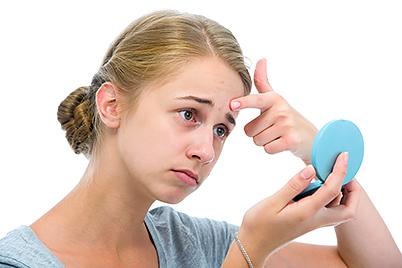HOW TO CHOOSE A DERMATOLOGIST?
Look at their credentials – check to see if they’re board certified. Do you prefer a medical doctor or a doctor of osteopathy? Some patients prefer one over the other. This is your personal choice and preference.
Attitude. How does the doctor answer and address your needs? A good doctor will listen to your questions and do his or her best to answer. Providing you with information you understand and not just medical terms.
Convenience. If you really enjoy a doctor’s office but find that it is too far out of your way. See if they’re willing to work around your schedule. That way you can drive after work or on a weekend.
Get faster results from treatment. Acne treatment takes time regardless of whether you’re treating mild or severe acne. That said, it does take less time and effort to clear a few pimples than a breakout that could include blackheads, whiteheads, and deep-seated acne cysts
Reduce scars. Treating acne early may prevent acne scars. In general, the more severe the acne, the more likely it is to scar

How Do I Find the Best Dermatologist?
THE HUMAN BODY HAS several built-in defense mechanisms that protect us from foreign organisms that may cause disease. Internally, the immune system takes the lead protecting us from infection. Externally, the skin – the body’s largest organ – plays an enormous role in preventing those invaders from gaining entry to the body in the first place.
To care for this critically important organ, you may need the help of a dermatologist, “a specialist doctor who cares for the skin, hair, nails, and mucus membranes,” says Dr. Christen M. Mowad, a dermatologist with Geisinger in Danville, Pennsylvania. “That encompasses a lot of diseases and conditions – by some reports it’s over 3,000 conditions and diseases,” she says.
“Skin cancer is also a huge component of what we do,” Mowad says. The American Cancer Society reports that cancers of the skin are “by far the most common of all types of cancer.” There are several different types of skin cancer to watch out for, with melanoma being the deadliest. Although melanoma accounts for only about 1 percent of skin cancers, it causes most skin cancer deaths. The ACS estimates that more than 91,000 new melanomas will be diagnosed in 2018 and more than 9,000 people will die of the disease this year. Seeing a dermatologist for an annual skin check can point out skin cancers sooner, which may help reduce your risk of dying of the disease.
That said, she notes that even if you came in to have a bump on your nose checked out, most dermatologists will probably also want to check the rest of your skin. “Most dermatologists at one point or another will want to do a complete skin exam, and that’s something that I find that patients don’t think in advance might happen.” If you come in for a rash on your hand, be prepared for the doctor to ask you to put on a gown so she can check all of your skin for other potential problems. “Certainly, the dermatologist will look at what you find troubling, but most dermatologists almost always want to look at the rest of your skin, too, to find lesions you maybe can’t see. If that spot on your nose is skin cancer, we want to look at your back to make sure that you don’t have a skin cancer there, too,” she says
When looking for the right dermatologist for your needs, Olbricht recommends starting by determining whether the doctor you’re considering is a board-certified dermatologist. “Board-certified dermatologists went to college and then went to medical or osteopathy school followed by an internship and then three years of dermatology residency. So, this is training that’s only in dermatology.” To achieve board-certification status, these doctors must also pass a rigorous exam, and to remain certified, they must continue their education and take additional examinations every 10 years

How Do You Find the Perfect Dermatologist For You?
Experience
Make sure you’re going to someone who knows what they’re doing. This does not mean you should discount a younger doctor, but I recommend doing your research. Look at their resumé, see if they’re clinical professors affiliated with medical schools, check if they have any research published, etc. If you’re looking for injections or lasers, I do recommend going to someone who’s been at it for a while.
Recommendations
Ask a friend with good skin for their derm! If they don’t want to divulge their secret, find a new friend to ask. Usually, an in-person recommendation counts more than a Yelp review, as anyone can post anything, and it’s not always an accurate reflection of what a doctor is actually like. You can also ask your primary care physician (if you like and trust them) for a referral
Social Media
I’m very torn about this, as I know many excellent doctors who either don’t bother with social media or have a subpar social media presence despite excelling in both medical and aesthetic work. There are a few reasons for this. Younger doctors (#millennials) tend to be more social media-savvy, so they are more inclined to advertise their practice on these platforms. Some of the more experienced hands in the field, however, are either too busy with patients or are otherwise disinterested in social media, which may exclude them from your search. If you’re finding your derm through social, do your due diligence, and make sure you’re not choosing this person just because their IG is really popping.
Certifications
Board certification is another somewhat controversial topic because the organizations that provide these certifications can have their own interests. Nevertheless, every good dermatologist I know is board-certified. Board certification ensures that your derm stays up to date with developments in the field and practices continuing education. This is crucial in medicine and science in general, where the knowledge base constantly evolves. You don’t want someone treating you the way they would have treated patients 50 years ago, or even 10 years ago.
Don’t be afraid to date!
Skin health is an ongoing journey, so you want to make sure your derm is the right long-term partner. Don’t be afraid to schedule initial consultations with different doctors or even switch doctors. Naturally, this requires some financial commitment, which isn’t an option for everyone, but if it is, take your time to find the right person. I’ve heard many stories of people not taking their dermatologist’s advice and diagnoses seriously because the personalities didn’t mesh well, the derm didn’t take the time to explain the diagnoses, and so on. In dermatology, bedside manner and patient education are especially important because skin is one of the few organs you can see. You’re going to be trusting and working with this person for a while, so make sure you get along, respect them, and feel listened to and valued as a patient.

How to Find a Good Dermatologist
Your skin is your largest organ and its health is important to your overall well-being. With so many things that can go awry with your skin, a good dermatologist is invaluable and can make a huge difference in the way you look and feel. So how do you go about choosing the right dermatologist and how do you know what to look for in a dermatologist? Here are some tips for how to find a good dermatologist that is right for you.
Check Their Biography
If you’ve found a handful of dermatologists that you’re considering, take a moment to check out their bios (usually posted on their website). Look for board certification specifically from the American Academy of Dermatology.
Schedule a Consultation
By scheduling a consultation with our Skin and Vein Centers, you can meet your potential dermatologist and get a feel for his or her mannerisms and abilities while also asking lots of questions about a procedure or issue you’re looking into. You may also be able to meet other patients in the waiting room and ask them about their experience with the dermatologist in question.
Listen to Learn
During your consultation with a prospective dermatologist, focus on listening. The best method is to give a vague reason for your visit and then let them do the talking. Perhaps mention the lines on your face or veins that you wish you didn’t have, but don’t go into detail about the methods you’ve researched on your own. Instead, listen to how the dermatologist would address the issues and their opinion will give you an idea for how aggressive their treatment methods are and what kind of approach they take to treating those issues.
Look for Recommendations
Online reviews and recommendations can be a little misleading for some who are looking for unbiased opinions and not just the most positive reviews that a dermatologist has chosen to present on their site. Ask friends, family members, and neighbors for a recommendation for a good dermatologist in your area, or ask your general practitioner for a recommendation for a dermatologist that they like and trust themselves.
How to Choose a Dermatologist? – Tips to Consider While Looking For a Dermatologist
Whether you are curious about knowing the latest anti-aging technology or getting rid of acne, choosing the right dermatologist could be daunting. It is essential to choose the right dermatologist as not all the dermatologists are equally skilled and experienced. Finding the right dermatologist requires time as well as efforts.
From normal hormonal acne treatment to regular skin cancer screenings, your dermatologist can help you with a wide range of skin issues. The right dermatologist will help you in balancing your skin health in an appropriate manner, which is why it is crucial to choose the right dermatologist.
Choosing the right dermatologist is a crucial decision, especially if you have a serious skin condition. So, find the dermatologist who will work appropriately to treat your skin condition. Now you must be thinking about how to choose the right dermatologist? If you have never visited a dermatologist, but if you are willing to and are ready to take this step, here are some simple tips to consider to choose the right dermatologist for you.
Take Reference from Your Primary Care Doctor
Make a referral list of dermatologists by taking advice from your primary care doctor. You can also take advice from your friends, family members, and other healthcare providers for better recommendations. A few names on the list increase the choices and help you in choosing the right one. Seek the dermatologist expert in dermatologic care and can carry out the cosmetic procedures appropriately.
Appropriately Research the Credentials of the Dermatologist
Certification from the board is one of the most important factors to consider while choosing the right dermatologist. Board certification defines that the doctor has essential skills and experience to render healthcare facilities in dermatology. In addition to this, make sure that the dermatologist does not have any history of disciplinary actions or malpractices.